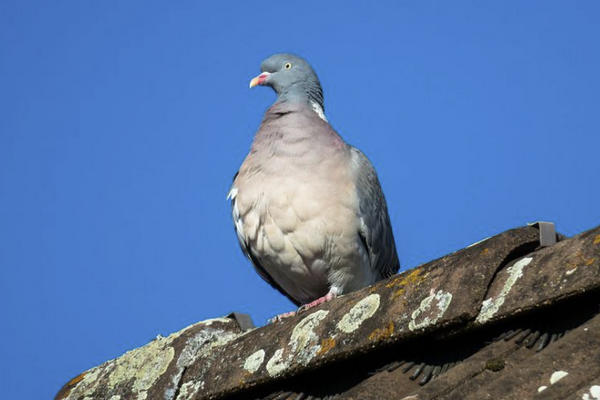
Birds are peaceful, beautiful creatures, but that doesn’t mean you want them building nests on your home. Pigeons are one of the most common birds in urban areas, but there are other birds you might want to stop from nesting.
To stop pigeons or birds from nesting on your house, the first step is to destroy empty nests and clean up around your home. Next, use bird deterrents like spikes and netting where birds have made nests or where they might like to make one in the future. Then, seal any entrances to the interior of your home like gaps, cracks and holes. Finally, you can use bird repellents like sticky gel, dummy predators or shiny objects.
Having a bird nest on your house can be frustrating. Keep reading this article to learn all the details to stop them from nesting on your home.
You may also be interested in reading this related article “How To Get Rid Of Rattlesnakes From Your House/Yard“.
Why You May Not Want Birds Nesting On Your House
A nesting bird isn’t always a welcome sight. Moreover, there are plenty of good reasons not to want birds nesting on your house, including:
- Invasive Bird Species- Animals from other parts of the world can take away nesting sites from native species. Stopping invasive birds from nesting on your house could help control their numbers and give native species a better chance to thrive.
- Messy Bird Nests– Feathers, poop and nest debris litter the area around a bird nest. The mess looks bad and it could harbor dangerous bacteria, so its best to stop birds from nesting on your house.
- Nest Guarding– Some species of birds are extremely protective of their nests and could attack you if they feel threatened. This behavior makes a bird nest dangerous to have near your home.
- Dangerous Nests– If birds build their nest in a dryer vent, chimney or gutter, it could damage your home and could be harmful to the birds. To keep your home working correctly and birds safe, its better they don’t build nests on your home.
- Regulations and Rules– Local ordinances, homeowner associations, business guidelines or fire safety regulations might disallow debris accumulation, even if it’s from a bird nest. There may not be ways around the rules and you’ll have to stop birds from nesting.
- Bird Phobia– Birds might cause extreme fear for some people, so having a nest on your house could make life too difficult.
If you need to stop birds from nesting on your house, take the following steps:
Step 1: Secure Your Trash and Clean Your Home’s Exterior
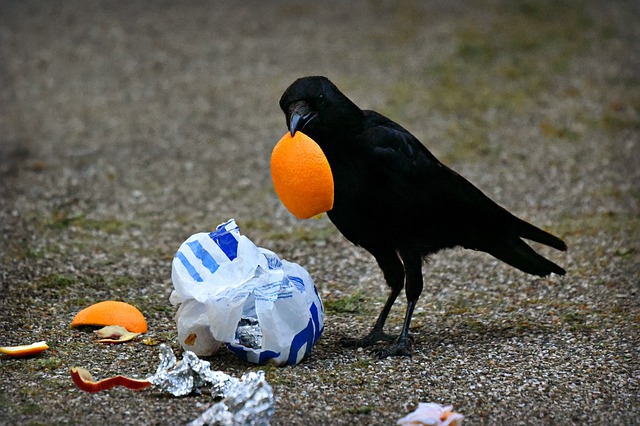
Start your pigeon-proofing by making your home less inviting for them. Your trash is a food source, and a dirty exterior is more comfortable for pigeons. Therefore, securing trash cans, recycling bins and compost receptacles while maintaining clean outdoor areas will stop pigeons from wanting to nest on your house.
Overgrown bushes, shrubs or grass are perfect places for pigeons to hide. Keeping your landscaping trimmed and getting rid of dead branches and yard waste eliminates places where pigeons feel safe. Afterwards, they will be less likely to make a nest on your house.
Going forward, you must be careful to clean well after outdoor dining. Never leave food scraps, dirty dishes or cooking utensils outside overnight. This habit will not only keep pigeons and birds from nesting but also stop most other pests from living near your home.
Step 2: Block Potential Pigeon and Bird Nesting Sites
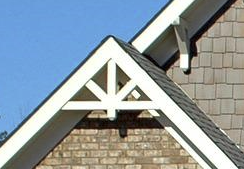
Many places around your home make ideal nesting sites for pigeons and other birds. Identifying nesting sites and blocking birds from landing there is an effective method to stop them. Some areas you might need to secure against birds are:
- Roofs
- Rafters
- Balconies
- Garages
- Sheds
- Attics
- Ledges
- Window Sills
Examine these areas and look for signs of pigeons, like, droppings, feathers and nest materials. Then, create a plan to block birds or pigeons from landing there and making a nest.
The best methods of blocking birds from nesting sites include:
Bird Spikes
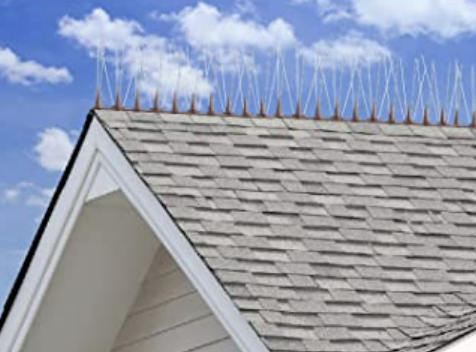
These three-pronged bird spikes can be attached to many areas that make good nesting sites. They work best for larger birds, including pigeons, but may be ineffective against small birds.
Attach bird spikes with construction adhesive, nails or wire. The spikes don’t hurt birds, instead, making it uncomfortable for them to land and sit. After being installed properly, bird spikes should last many years without maintenance.
Bird Netting
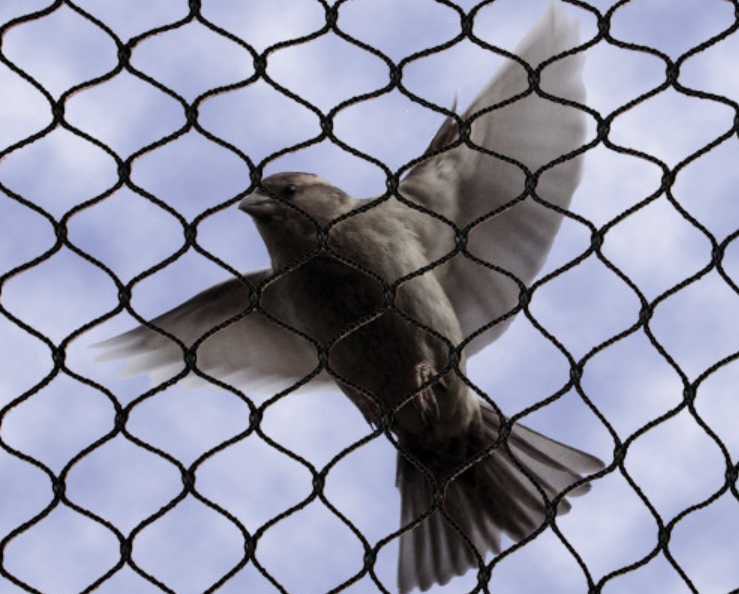
Bird netting could be the best solution for places where you can’t put bird spikes or to stop small birds. Staple bird netting around nesting areas so that birds can’t access them.
Be neat when attaching the bird netting, or you could accidentally leave a new spot where birds could create a nest. Don’t leave any gaps in your bird netting and this method will stop birds from nesting on your house for many seasons.
Step 3: Seal Potential Entrances To Your House
Pigeons and birds are smart and will exploit any way into your house to shelter from weather or predators. Sealing all entrances to your home is essential to stopping these winged animals from nesting inside.
Therefore, you must do a thorough inspection of the perimeter of your home for gaps, cracks, holes or anywhere a bird could fit through and gain access. Next, take measures to seal the entrances.
You can use caulking for smaller cracks. For larger holes, you can use blocks of wood, hardware cloth, steel mesh or bird netting. If your roof has holes that birds are nesting in, it is time to have a roofing contractor out to your house to do the necessary repairs.
Step 4: Apply Bird Repellents Or Use Scare Tactics
Gel solutions are a popular bird repellent that makes surfaces sticky and uncomfortable for birds to land on. You apply the gel to horizontal surfaces with a caulking gun. It needs to be applied every six months.
Reflective deterrents distract and disorient birds to keep them away from nesting sites. Reflective tape or ribbons can be hung around balconies or patios. Reflective discs can be hung from trees where birds like to nest to scare them away.
Owls and hawks are predators of pigeons and other small birds. You can place owl and hawk figures around your property to make other birds afraid to come around. Also, playing hawk or owl calls from loudspeakers could also scare birds away from your home.
How To Trap Birds
If birds or pigeons are in your home, you need to trap them and get them out. You can use a special pigeon trap, or most small game traps will work. These traps usually lure birds inside with food, then shut after the bird is inside.
Before releasing the bird into the wild, check your local regulations to do it in a way that won’t disturb the environment or your community. If the bird is injured, you can try to find a wildlife rescue nearby or a veterinarian who helps wild animals.
Trapping birds could be time-consuming and dangerous. You should consider getting help from a pest control expert or wildlife agency.
How Do I Stop Pigeons Nesting On My Balcony?
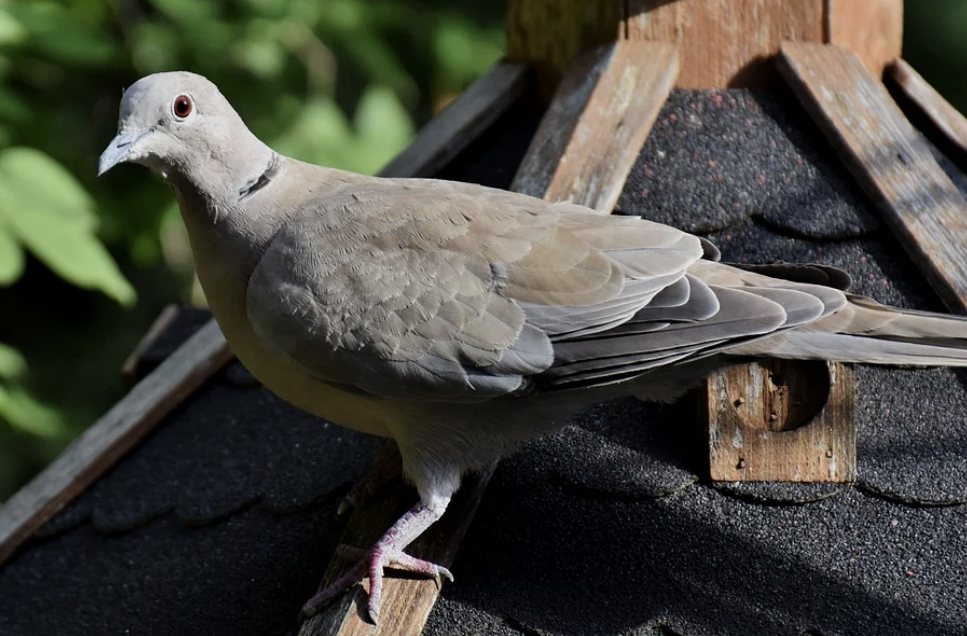
Balconies make perfect nesting sites for pigeons where they can create an overwhelming mess. Luckily, balconies are small spaces and easy to control. Some ideas to get pigeons to stay away from your balcony are:
- Use a motion-activated speaker to play predator sounds.
- Keep a rubber snake on the balcony.
- Decorate with reflective ribbon and mirrors.
One fun solution to pigeons on your balcony is to adopt a cat or two. Cats love chasing birds, and pigeons won’t come around if they see your feline friend hanging out. Beware, if your cat catches a bird, it will kill it and you will have a mess to clean up and you might feel sad.
Declutter your balcony so pigeons won’t have places to hide. It could help to keep the area empty for a few weeks after you have a nesting problem. Keep your furniture or plants in another location to deter pigeons from reestablishing a nest.
Do Wind Chimes Keep Birds Away?
Hanging a new wind chime could scare birds away at first, but they will get used to it and come back if you don’t take other measures to keep them away. Birds will get used to noises like wind chimes if they find your house is a good nesting site.
A good use for wind chimes is to scare problem birds away so you can have time to set up other anti-bird measures. Moreover, wind chimes might repel new birds from thinking your house is a suitable place to hang out. Unfortunately, wind chimes aren’t a guarantee to keep birds away.
What Happens If You Destroy A Pigeon Nest?
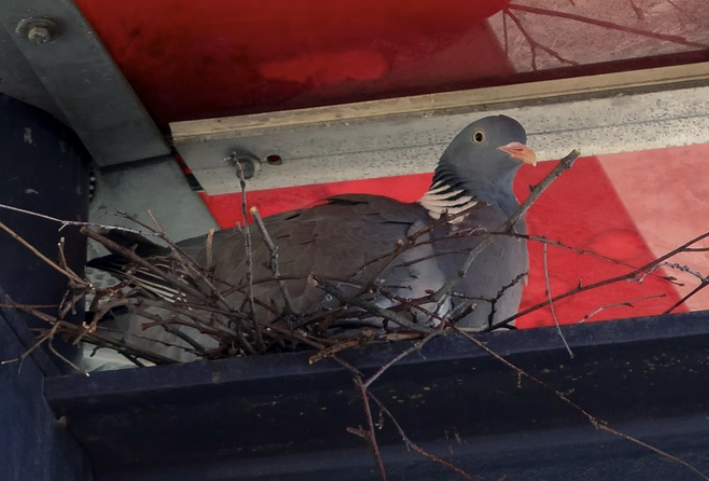
If you destroy a pigeon’s nest, the pigeons will abandon it. Baby pigeons in the nest will be abandoned and starve if left alone. Be patient and let the chicks fly away on their own, they need about four weeks in the nest before they leave for good.
If you find a pigeon nest without chicks on your house, destroy it as quickly as possible. That way, you won’t have to harm the baby pigeons, and the adults can find a better site. After destroying the nest, take measures to prevent the pigeons from returning.
What Smells Will Keep Birds Away?
Interestingly, birds don’t like to be around strong smells. Going off that thought, dousing a nesting site in a smell you enjoy could help keep birds away. Some essential oils you could use to keep birds away are:
- Peppermint
- Citronella
- Lemon
- Cayenne
- Garlic
To use scents to keep birds away, make a solution of 20 drops of the essential oil of your choice and one cup of water. Put the solution in a spray bottle and thoroughly wet the areas you don’t want birds to nest in. You might need to apply more scents everyday because they will degrade quickly.
Will Spraying Vinegar Keep Birds Away?
Spraying vinegar where birds like to nest could keep them away, but it’s not guaranteed. Birds don’t like the smell of vinegar, which could make them feel uneasy about building a nest on your house.
On the other hand, the vinegar smell will dissipate quickly, and it will be a lot of work to keep spraying more vinegar. Also, the acidity of vinegar could damage surfaces around your home. For these reasons, spraying vinegar could keep birds away, but it may not be a practical solution to stop birds from nesting on your house.